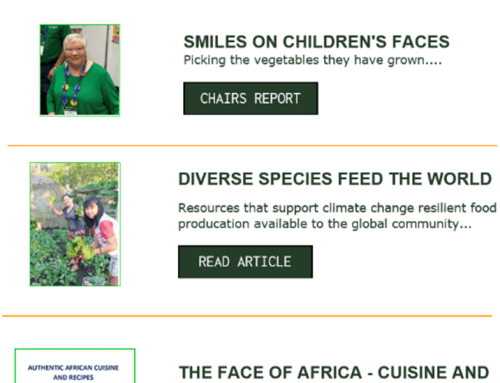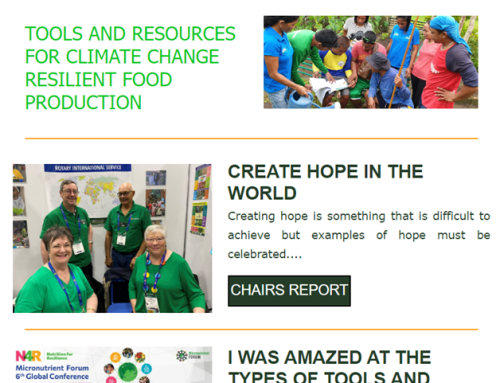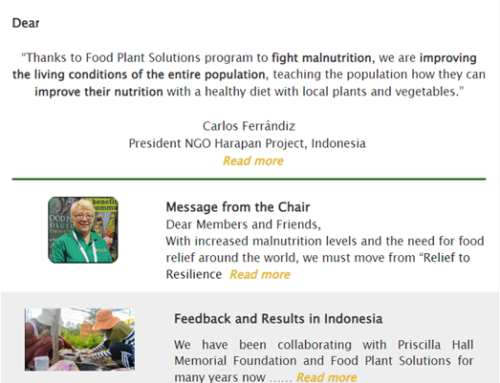Addressing the Issue of Food Insecurity
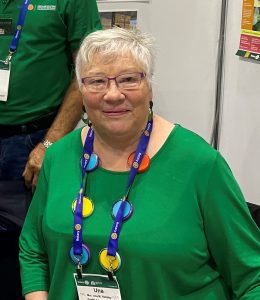
CHAIRS REPORT
In Our Response
As I write this message, Australia has had an Easter holiday break. Families have got together where they can, people have gone camping and many people have eaten too much chocolate!
But turning on the television has brought me back to earth with a thud.
Firstly I want to thank all the agencies who have been delivering food to people in Gaza, Ukraine, Israel, Sudan and other countries where families are in need, and malnutrition spreads. Some of these families had gardens to grow vegetables, before these wars. Now they have been bombed and no food is available. Now, more than ever, we need to help families in countries, near these war zones, to produce nutritious food for these people.
Does your club work in countries nearby?
Perhaps you are providing water wells for these communities? Maybe you are working in schools? If you are putting in a water well, how about adding a garden? If you are building schools or community centers, also add a garden. Food Plant Solutions can provide you with educational materials. Please scan our website to see if we have already developed these for the particular country you are working in. If not, just ask us.
A fried sent me this quote, I think it has relevance for us all.
“Between stimulus and response there is a space. In that space is our power to choose our response. In our response lies growth and freedom”.
Victor Frankle
Food Plant Solutions Rotary Action Group does not have a booth this year at the Convention in Singapore, but I would be happy to talk with you. Please leave a card with a request on the notice board and I will make a time to meet, or email me unahob@gmail.com
Yours in Rotary
Una
PDG Una Hobday OAM PhF
Chair Food Plant Solutions Rotary Action Group
Service Above Self Awardee 23/24
NUTRITION TRAINING FOR AERIAL HEALTH PATROLS – PAPUA NEW GUINEA
An invitation from Aerial Health Patrols (AHP) to lead their annual in-service training in nutrition followed a Zoom presentation to the group on the Food Plant Solutions (FPS) sponsored, Rotary-funded project: “Alleviation of Malnutrition in PNG” two years ago. Child malnutrition in PNG is among the worst in the world and AHP wished to add child and maternal nutrition to their existing programs of health education for villagers, which includes water, sanitation and hygiene, family planning, maternal and post-natal care, midwifery and breast feeding. These all focus on achieving behavioural change for improved health outcomes. Ultimately, the nutrition training was directed to improved, balanced, nutritional diets, particularly for village children and mothers.
The Medical staff of Aerial Health Patrols (AHP) provide a wide range of health services to 45 remote villages in Western Province, PNG which do not have existing health services. There are currently 12 teams of about 6 health professionals each who fly into remote villages and stay for 3 days each, providing clinical services, vaccinations, etc as well as health awareness training.
About 130 medical staff (2 doctors, several highly trained sisters, nurses and paramedics) and support staff, not only from AHP, but also from local hospitals and health centres in Balimo and Morehead (centre of mining activities and a hospital) attended the week-long training. The expectation is that this team of medical professionals will disseminate the FPS information I previously provided to about 41 villages in the Strickland Bosavi region to the additional 45 villages that the teams service in Western Province, expanding the limited outreach my work was able to achieve.
AHP teams enthusiastically undertake their essential roles to achieve better health outcomes for many village communities. AHP is not a Government body, it is funded by PNG Sustainable Development that controls the accumulated royalties from the OK Tedi mine, and uses the interest from royalty funds (ca US$200 million annually) to provide lasting benefits for the people of PNG. For example, it is also funding upgrades to the Morehead hospital (and so many more development initiatives). Their story is an excellent one, helping to bring about real and sustainable changes for impoverished village people, including improved nutrition based on FPS principles. The AHP team members are all friendly, dedicated and enthusiastic about their contributions to making better lives for impoverished villagers in Western Province. Time was well spent in Balimo, particularly if mothers and babies now should enjoy improved diets.
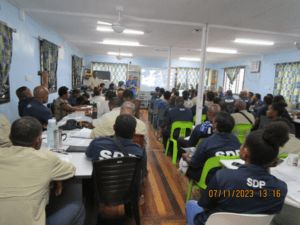
FOOD GROWING KNOWLEDGE IS POWER
The Country Women’s Association in Tasmania Online Branch are a statewide branch of CWA in Tasmania Inc. We provide support to assist with the needs of rural women, their families and communities. We are strong advocates for elevating the voices of rural women and the agricultural sector in Tasmania.
Sustainability and food security are prominent themes throughout our projects. Food growing knowledge is power and increasingly important as people struggle with the challenges of the rising cost of living. To grow food is a basic human right while aspiring to community sufficiency ensures that no one is left behind. We encourage people to sow, grow and thrive and to support local farmers and their agricultural bioregion.
The excellent quality publications produced by Food Plant Solutions aim to empower individuals and communities through education to grow nutrient dense local foods. Quality content is important in educating future generations to feed themselves and to gather and harness the knowledge needed to feed communities with healthy, accessible nutritious produce.
The CWA Online Branch are proud to support the inspirational work of Food Plant Solutions by assisting with distribution of their Tasmanian Guide to Nutritious Edible Plants to those who will benefit most in our communities.
Editors Note: Resources such as the Tasmanian Guide to Nutritious Edible Plants can be made for any region, contact us to learn more info@foodplantsolutions.org
LOCAL AND ORGANIC: FROM BANGLADESH
As the Director of policy and Strategy of IFOAM-Organics Asia and Ambassador of IFOAM-Organics International, and a Board Member of Global Landcare and President of Landcare Bangladesh Shaikh Tanveer Hossain, immediately understood the importance of Food Plant Solutions. Tanveer has said:
“I started my career as a Scientist at the Bangladesh Rice Research Institute (BRRI) and over the past two decades, I have worked in various non-governmental and intergovernmental organizations, focusing on sustainable agriculture and food systems development. One of my unique contributions was the initiation of the organic sack gardening method in Bangladesh in 2010. This innovative approach garnered attention from many stakeholders in unfavorable ecosystems and urban dwellers, especially during the COVID-19 pandemic when the need to produce safe products was paramount. My innovation was recognized with the grand prize of the ‘Organic Farming Innovation Award (OFIA)’ by IFOAM and RDA, South Korea, in 2011 and has been scaled to wider communities.
Recently, I saw an interview with the Executive Officer of Food Plant Solutions. I was impressed to see their fantastic works and publications. I started communicating with them on how to utilize the excellent resources on not-popular but nutrition-rich crops in Bangladesh to enhance food security. Food Plant Solutions offered me the opportunity to engage in their ongoing Potentially Important Food Plants project in Bangladesh. It was a fantastic experience to assist in the of this book, which was published as a Field Guide in March 2024. For me, it was another new journey and knowledge bank!
Local food plants are a great resource for a country, and Asia, including Bangladesh, has a long history of diverse plants and crops. Unfortunately, we have not utilized these resources and potentiality in our food systems. These local plants not only have nutritious value but also many medicinal and health benefits. Indigenous knowledge and resources are key components in the present world for coping with climate change and the transformation of food systems.
Thanks to the Food Plant Solutions program for connecting with me and finding opportunities to work together against malnutrition. We can unitedly create a world where we provide people with better nutrition and a healthy diet with local plants and vegetables utilizing indigenous knowledge. We must remember the ecosystem services and protect the global diversity for our survival!
Let’s work together for the better future!
Dr Shaikh Tanveer Hossain

A ROTARACT PERSPECTIVE – WHY JOIN FOOD PLANT SOLUTIONS
I am Emmanuel Maleka, a Pharmaceutical Scientist and pioneer fellow of Master of Science in Pharmaceutical Analysis at Mbarara University of Science and Technology (MUST) in Uganda. As an innovator especially in Product Development, I have formulated a couple of Pharmaceutical and Cosmetic products, some of which have been able to win small innovation seed grants. I have started a small pharmaceutical company (Maleka Organics Ltd) mainly dealing in organic products, with a vision to put an end to anti-microbial resistance by 2040.
I joined Rotary first as an Interactor in high school, transitioned to a Rotaractor at University and I look forward to joining a Rotary club as soon as I finish my degree. I am currently the Vice President of Rotaract club of MUST. I was inspired by philanthropy, something I believe builds better societies as we give back to communities, especially the underprivileged. Rotary through its annual themes, goals and objectives, aims at providing service to others, promoting integrity and advancing world understanding, goodwill and peace through grooming business and professional leaders. I joined to be a part of that and certainly to serve.
I became a part of the Food Plant Solutions Rotary Action Group because I am passionate about making a desirable global impact by addressing food security issues. I’m also interested in promoting sustainable agriculture practices that utilize locally available food plants to improve nutrition and livelihoods in communities. FPS RAG provides a platform for networking and collaborating with like-minded peers, organizations and Rotary clubs to implement effective solutions; such an opportunity I would love to seize.
As a newly appointed FPS RAG Rotaractor Champion, I aim to raise awareness about the importance of food plants in curbing malnutrition and food insecurity within communities especially in Uganda where I’m situated. I hope to support in creating educational materials translated to local languages and teach communities about the nutritional value and cultivation of underutilized food plants. Through collaborating with various local farmers and Rotary clubs, I intend to implement projects that utilize locally available food plants to improve nutrition and food security in communities where they’re based.
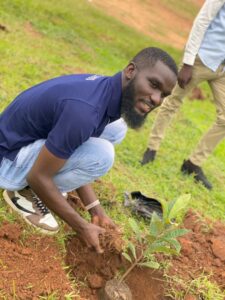
UNIQUE MEMBERSHIP
Recognising the many demands, Food Plant Solutions has a range of unique memberships; there is sure to be one that suits you.
Rotaractors Membership $A15 annually
Individual Membership $A30 annually (or $A125 for 5 years)
Individual Champion $A100 annually (or $A400 for 5 years)
Club Membership $A100 annually
Club Champion $A500 annually
Join today and become part of a team that is making a real difference to food security and malnutrition.
IF YOU ARE AN INSPIRED INDIVIDUAL
Who wants to drive meaningful change, with a focus on climate-change resilient food production and make a difference to the lives of many, we want to hear from you.
We have opportunities available for professionals to join our team in a variety of volunteer roles.
Formed in 2007, and designed to address malnutrition and ensure food security, Food Plant Solutions Rotary Action Group has over 150 published materials, for nearly 60 countries.
Internationally recognised, volunteering with Food Plant Solutions Rotary Action Group offers opportunities, in a meaningful and connected environment, whilst providing service and networking opportunities.
ARE YOU FOLLOWING US?
Learn more and keep up-to-date with our latest news.
https://www.youtube.com/channel/UCqFdSc5720E0BfMTBy8Mcfg


